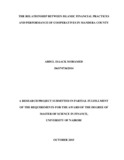| dc.description.abstract | Islamic finance, as a financial model based on Islamic Shari‟ah has grown enormously across the world and especially so in Kenya. The study sought to establish the relationship between the implementation of Islamic financial practices and the performance of cooperatives in Mandera County in Kenya. The study used descriptive research design. The population of the study comprised all the active cooperatives in Mandera County which were 18. The major reason behind targeting the relationship between the implementation of Islamic financial practices and the performance of cooperatives in Mandera County was because the residents of the area are mostly Muslims and as such will enable better understanding and analysis of the variables involved. Secondary data was used in this study; specifically the study used financial statements that were obtained from the cooperatives and their respective explanatory notes which properly brought out the predicted relationship. The data was coded using SPSS. Descriptive statistics was used to summarize the data; this included the use of weighted means, standard deviation. Pearson moment correlation was conducted to establish the linear relationship between study variables. Regression analysis was conducted to establish the nature of the relationship. The study found a positive correlation between implementation of Islamic financial practices and the performance of cooperatives in Mandera County. These practices include Musharaka, Mudaraba, Murabaha, and other Islamic financial practices.. The study found strong positive correlation between performance of cooperatives in Mandera county and technology usage. The study concludes that all the Islamic financial practices had a positive impact on the performance of cooperatives in Mandera County and this relationship was exacerbated by the increasing number of Muslims in Mandera County and the failure of the existing conventional banks to adopt their products to the needs of the people in the area. The research recommends that cooperatives in Mandera county need to continue offering Islamic finance products and more so ensure that their members be made aware on the availability of the products and the advantages that they will derive from utilizing the available products. From the Islamic financial practices analyzed in relation to cooperatives, Musharaka was found to be the most desired and preferred by members, followed by Mudaraba and Murabaha. The impact of technology on the performance of cooperatives is also clearly brought out and in the current global village, cooperatives need to up their game in order to survive and remain relevant. The cooperatives that are technologically advanced were found to be performing better than the cooperatives that are not using technology, short messages and social media were among the platforms that cooperatives are utilizing to enable them survive in Mandera County. | en_US |

